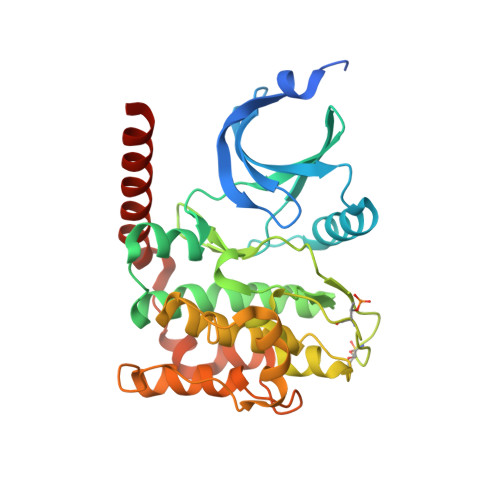Pharmacological targeting of kinases MST1 and MST2 augments tissue repair and regeneration
Fan, F., He, Z., Kong, L.L., Chen, Q., Yuan, Q., Zhang, S., Ye, J., Liu, H., Sun, X., Geng, J., Yuan, L., Hong, L., Xiao, C., Zhang, W., Sun, X., Li, Y., Wang, P., Huang, L., Wu, X., Ji, Z., Wu, Q., Xia, N.S., Gray, N.S., Chen, L., Yun, C.H., Deng, X., Zhou, D.(2016) Sci Transl Med 8: 352ra108-352ra108
- PubMed: 27535619
- DOI: https://doi.org/10.1126/scitranslmed.aaf2304
- Primary Citation of Related Structures:
5DH3 - PubMed Abstract:
Tissue repair and regenerative medicine address the important medical needs to replace damaged tissue with functional tissue. Most regenerative medicine strategies have focused on delivering biomaterials and cells, yet there is the untapped potential for drug-induced regeneration with good specificity and safety profiles. The Hippo pathway is a key regulator of organ size and regeneration by inhibiting cell proliferation and promoting apoptosis. Kinases MST1 and MST2 (MST1/2), the mammalian Hippo orthologs, are central components of this pathway and are, therefore, strong target candidates for pharmacologically induced tissue regeneration. We report the discovery of a reversible and selective MST1/2 inhibitor, 4-((5,10-dimethyl-6-oxo-6,10-dihydro-5H-pyrimido[5,4-b]thieno[3,2-e][1,4]diazepin-2-yl)amino)benzenesulfonamide (XMU-MP-1), using an enzyme-linked immunosorbent assay-based high-throughput biochemical assay. The cocrystal structure and the structure-activity relationship confirmed that XMU-MP-1 is on-target to MST1/2. XMU-MP-1 blocked MST1/2 kinase activities, thereby activating the downstream effector Yes-associated protein and promoting cell growth. XMU-MP-1 displayed excellent in vivo pharmacokinetics and was able to augment mouse intestinal repair, as well as liver repair and regeneration, in both acute and chronic liver injury mouse models at a dose of 1 to 3 mg/kg via intraperitoneal injection. XMU-MP-1 treatment exhibited substantially greater repopulation rate of human hepatocytes in the Fah-deficient mouse model than in the vehicle-treated control, indicating that XMU-MP-1 treatment might facilitate human liver regeneration. Thus, the pharmacological modulation of MST1/2 kinase activities provides a novel approach to potentiate tissue repair and regeneration, with XMU-MP-1 as the first lead for the development of targeted regenerative therapeutics.
- State Key Laboratory of Cellular Stress Biology, Innovation Center for Cell Signaling Network, School of Life Sciences, Xiamen University, Xiamen, Fujian 361102, China. State-Province Joint Engineering Laboratory of Targeted Drugs from Natural Products, Xiamen University, Xiamen, Fujian 361102, China.
Organizational Affiliation:




















